Photographs: Mian Khursheed/Reuters
United States Congressman Mike Rogers, a Michigan Republican who chairs the House Permanent Select Committee on Intelligence, has said that if there's evidence of official Pakistani complicity in the harbouring of Al Qaeda chief Osama bin Laden in Abbottabad, there's no way this can be kept a secret from the American public.
The committee has been provided with a classified briefing by the Central Intelligence Agency on the killing of Osama by the elite US Navy Seals.
Rogers, who was speaking at the Council on Foreign Relations in Washington, DC in the aftermath of the killing of Osama, also said the Haqqani network based in Pakistan may have helped in the logistics in the bombings and terrorist actions in India.
Speaking on whether evidence regarding Pakistan's complicity in the harbouring of bin Laden, if found, would be made public, Rogers said, "Pakistan is one of the most confusing relationships we've had with another country."
Reportage: Aziz Haniffa
'There are days when you think this is a good ally'
Image: A newspaper stand displays magazines and posters bearing the pictures of Osama bin LadenPhotographs: Athar Hussain/Reuters
Rogers said Pakistan has "also helped us arrest nearly 600 Al Qaeda and Taliban leaders -- everybody from bomb-makers to financiers to weapons-dealers and the whole host of everything in-between."
"So, there are days when you think this is a good ally, this is somebody we need to be a partner with. But at the same time, they hold a diplomat (Raymond Davis) for 42 days, who had immunity status, against a treaty which they signed and they interrogated him," he said. "I mean, (it is) just unbelievable for a country that wants to join the rest of the world as a law-abiding country."
'We are asking lots of questions'
Image: Supporters of Jamaat-e-Islami hold a banner during an anti-American rallyPhotographs: Athar Hussain/Reuters
"Who knew and what they knew is something we are asking lots of questions about," he said.
Rogers said, "We do know that the Frontier Corps is riddled with sympathisers to the Taliban, mostly because it is familiar -- they have family ties that cross tribes -- and that has presented a huge problem."
He said US intelligence is also very much aware that certain Inter Services Intelligence members have close associations with the Taliban "and certain Al Qaeda and the Haqqani network, which I argue is like an organised crime family than it is a tribe. You have all those problems, all going on, all at the same time. It's a confusing place and our national interests haven't lined up."
Rogers said that despite all of these internal fissures, Pakistan "has not really come to the conclusion that the Taliban and the Al Qaeda is a bigger threat than India. They believe India is their problem and so that has been."
'We need to know who, what, when and why'
Image: Pakistanis participate in a silent prayer after an anti-American rally in PeshawarPhotographs: Fayaz Aziz/Reuters
But Rogers said, now in the wake of bin Laden being killed in Pakistan in a military garrison town in close proximity to its military academy equivalent to America's West Point, "It is inherent as our relationship continues that we know who, what, when and why about Osama bin Laden being in this particular compound for as much as five years."
Pakistan would have to answer all these tough questions, he said.
However, at the same time, Rogers said, "I will tell you today, that all the information that I have seen, we can't conclusively say that somebody senior knew and promoted a safe haven (for bin Laden). Clearly, there may have been elements that knew and looked the other way. But we can't say the institutions knew and looked the other way."
'When doesn't anything not become public here'
Image: A wall painted with the misspelled words 'Bin Ladan Toun' in AbbottabadPhotographs: Faisal Mahmood/Reuters
But when pressed that if evidence were found of official Pakistan complicity in harbouring bin Laden and if such evidence will be made available to the American public, the former Federal Bureau of Investigation Special Agent turned senior lawmaker who wields enormous clout on intelligence matters and is privy to all the classified material and secrets, said, "This is Washington, DC, and when doesn't anything not become public in this town? Clearly, that information will be made public if it is true."
Asked about the claim by Pakistan that the ISI had shared information with the United States at some level leading to the detection and killing of Osama bin Laden at his compound in Abbottabad, the lawmaker acknowledged, "Pakistan has been helpful in the past. So, it should come as no surprise to anyone that it would say that they believe that they have shared information in the past that may have ultimately led to Osama bin Laden's whereabouts."
'This has to be a transparent and open relationship'
Image: An anti-US rally on the outskirts of QuettaPhotographs: Naseer Ahmed/Reuters
"Again, they have been on again, and off again. They've been helpful with some detainees they take into custody and we get access to fully, (but) some we don't. And, that's been the frustration with dealing with the ISI, the army and the government of Pakistan," he said.
Rogers reiterated, "We'll go back and do the forensics on all of this. That will happen. This is the time for Pakistan and the United States to say, done deal, Osama bin Laden is gone, we have lots and lots of work to do. The Haqqani network is still alive and well. It is producing suicide bombers, logistics, finance and soldiers in the fight for Afghanistan and we believe they have some logistical role in helpings in the bombings in India."
Thus, he said, the message from Washington to Islamabad is, "We want to be your friends, we want to help you, but this has to be a transparent and open relationship where we both fully understand the threat of Taliban and al Qaeda elements."

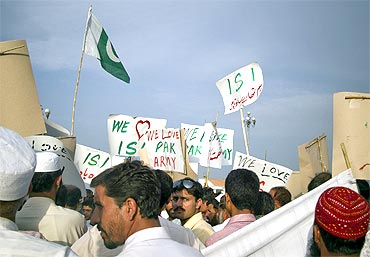
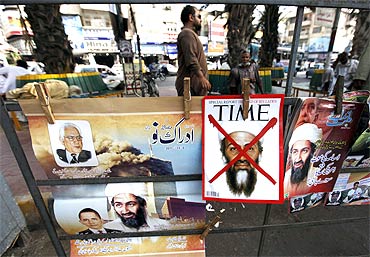
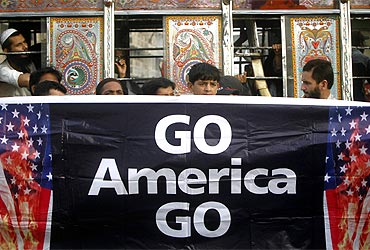
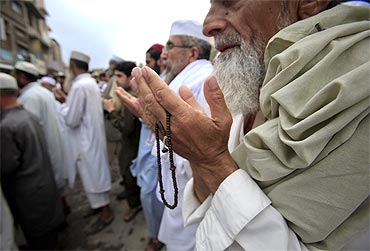
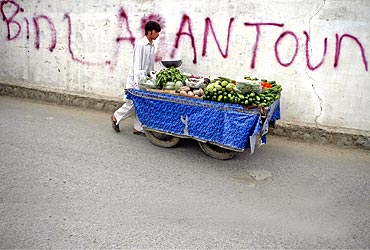
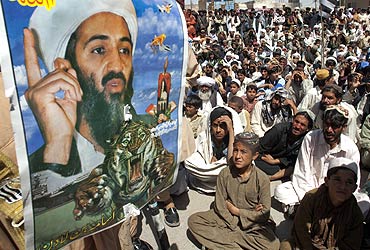
article